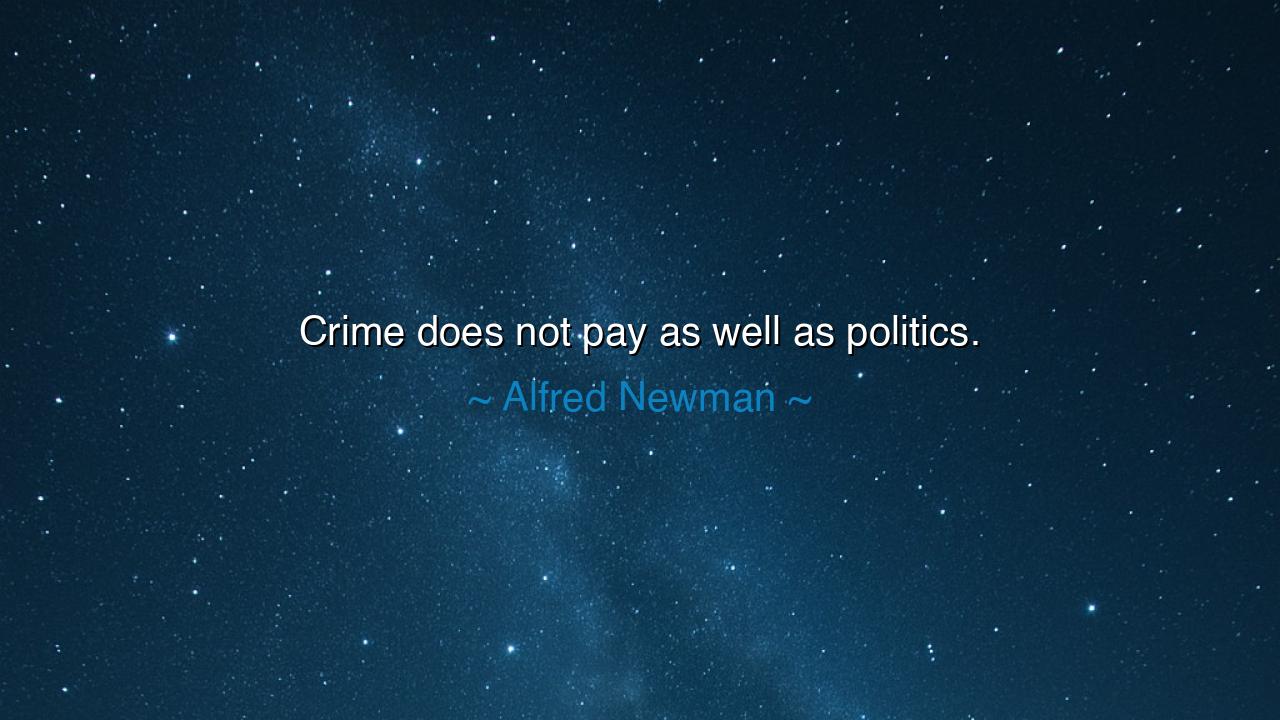
Crime does not pay as well as politics.






The words of Alfred Newman strike with the sharpness of satire: “Crime does not pay as well as politics.” Beneath the jest lies a deep and unsettling truth—that the pursuit of power often rewards its seekers more richly than the pursuits of thieves and robbers. For the criminal acts outside the law and is hunted, but the politician may cloak the same ambitions in the mantle of legitimacy, and there reap greater treasures than any bandit could dream.
The ancients themselves bore witness to this. Consider Julius Caesar, who, had he been a brigand, would have been crushed by Rome. Yet by donning the robes of state, by conquering Gaul and seizing the Senate, he gathered wealth and authority beyond measure. His triumphs were hailed not as theft but as conquest, though the fruits were plunder and dominion. Thus, politics became the grand stage upon which ambition could act without shame, and the rewards of the statesman far outshone the spoils of the outlaw.
History also tells of the Gilded Age in America, where great magnates and their allies in government prospered amidst corruption. Bribery, monopolies, and rigged contracts filled the coffers of men who, had they done the same deeds in secret, would have been named criminals. Yet beneath the banner of politics, they were praised as leaders and builders of industry. This is Newman’s sting: the same cunning that earns chains in the alley may earn crowns in the palace, if only it wears the cloak of politics.
And yet, the saying is not merely cynicism, but also a warning. For though crime and politics may seem kin, one masquerading as the other, history shows that corruption breeds downfall. Rome fell not by the sword alone but by the decay of its rulers. Nations crumble when politics becomes too like crime, when the public trust is sold as though it were plunder. The gold may be greater, but the ruin too is greater, and its shadow lingers long.
Therefore, O children of the future, mark this wisdom well: the riches of politics may outshine the spoils of crime, but their misuse poisons the well of nations. If you would tread the path of politics, live not as the thief in robes, but as the guardian of the people. For though the rewards of corruption are swift and dazzling, the honor of true service outlives both crime and empire, shining brighter than any ill-gotten treasure.






HTminh hai Tran
Newman’s quote about crime and politics feels like a commentary on the morally gray area that often surrounds political power. It raises the question of whether politics, as a system of governance, is inherently corrupt, or whether it’s the individuals within it who cause the issues. Is this a reflection on the human desire for power and wealth, and how can we reform systems that allow such corruption to thrive without consequence?
KNVo Nguyen Kim Ngan
Alfred Newman's quote highlights the cynicism people often feel about politics. It suggests that while politics may be ‘legal,’ it can be just as corrupt, if not more so, than crime. How much of this view is shaped by scandals and high-profile political corruption cases? Are we becoming too disillusioned with the system, or is this perspective a necessary critique to keep our political leaders accountable?
PKle nguyen phu khang
Newman’s statement that crime doesn’t pay as well as politics is a witty jab at the corruptibility within political systems. It’s a stark reminder of the unethical practices that can sometimes go unchecked in politics, especially when power is at stake. Does this mean we’ve reached a point where corruption in politics has become normalized? Can true integrity and honesty ever thrive in the political world, or are they inherently at odds with the system?
TBTRINH TON BAO
Alfred Newman's quote is a sharp and cynical comment on the intersection of crime and politics. It seems to suggest that politics, while legally sanctioned, may involve unethical practices that pay off far more than crime. But does this undermine the notion that politics should be about service to the public? What does it say about the nature of political power when it’s compared to the illicit gains of crime?